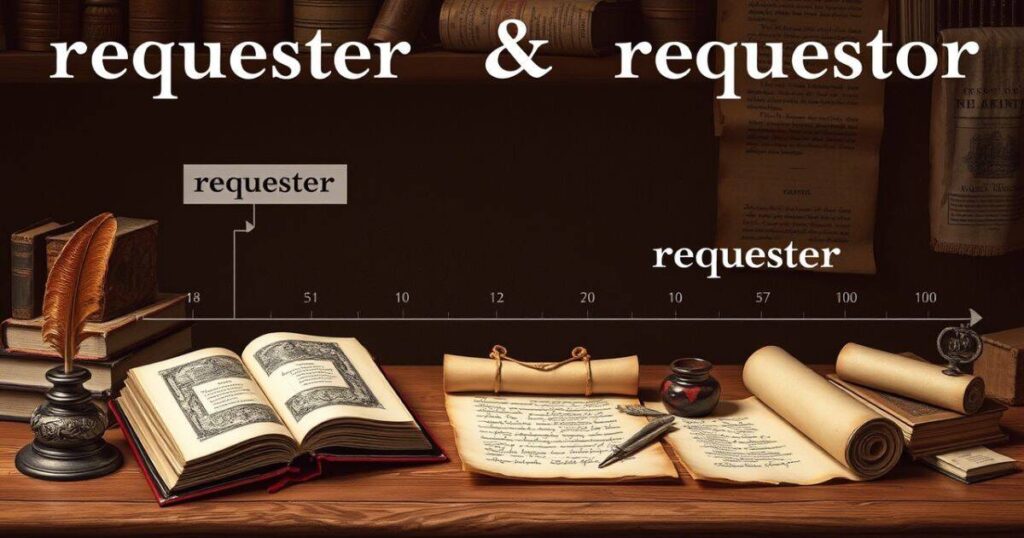When you need to ask for something, you might wonder whether to use “requester” or “requestor.” Both words refer to someone who makes a request, but there is a small difference in their use. In most cases, requester is the more common choice, especially in modern English. However, requestor still appears in some legal and formal settings.
So, is there a big difference between requester vs requestor? Not really. The words are synonyms and can be used interchangeably in many contexts. Requestor or requester both describe the person making a request. But remember, requestor can sometimes sound more formal, particularly in legal documents. Whether you choose requestor or requester, both will work.
What do “Requester” and “Requestor” Mean?
- Definition: Both requester and requestor refer to someone who makes a request or asks for something.
- Synonyms: These two terms are synonyms, meaning they have the same meaning but differ in usage.
- Common Usage: Requester is more commonly used in everyday language and casual conversations.
- Formality: Requestor is typically used in formal or legal settings, while requester is less formal.
- Preference in Business: In business settings, requester is generally preferred, as it sounds more approachable and casual.
- Legal Context: Requestor is more frequently used in legal documents, contracts, and formal petitions.
- Regional Use: Both words are accepted in American and British English, but requester is used more widely.
- Technical Fields: In technical fields like computer programming or APIs, requestor might be used to describe the person or entity making a request for data.
- Tone: Requestor tends to sound more official, while requester keeps things neutral and more conversational.
- Interchangeability: In most cases, requester and requestor can be used interchangeably, depending on the level of formality you wish to convey.
Related Guide:
Cancellation vs Cancelation: Which Spelling is Correct?
“Requester” vs “Requester”

- Synonyms: These two terms are synonyms, meaning they have the same meaning but differ in usage.
- Common Usage: Requester is more commonly used in everyday language and casual conversations.
- Formality: Requestor is typically used in formal or legal settings, while requester is less formal.
- Preference in Business: In business settings, requester is generally preferred, as it sounds more approachable and casual.
- Legal Context: Requestor is more frequently used in legal documents, contracts, and formal petitions.
- Regional Use: Both words are accepted in American and British English, but requester is used more widely.
- Technical Fields: In technical fields like computer programming or APIs, requestor might be used to describe the person or entity making a request for data.
- Tone: Requestor tends to sound more official, while requester keeps things neutral and more conversational.
- Interchangeability: In most cases, requester and requestor can be used interchangeably, depending on the level of formality you wish to convey.
- Definition: Both requester and requestor refer to someone who makes a request or asks for something.
Choosing the Right Term
Choosing the right term is more than just picking a word it’s about clarity, precision, and context. Whether you’re writing a legal document, a business proposal, or a casual blog post, the term you choose can shape how your message is received. A well-chosen term cuts through confusion and sets the tone, while the wrong one might mislead or alienate your audience.
Think of it like tuning an instrument before a concert when the term fits just right, the entire piece resonates. It’s not just about vocabulary, it’s about making sure your meaning lands exactly where you want it to. Are you deciding between a few terms for a specific purpose?
| Aspect | Requester | Requestor |
| Usage Frequency | More common in general and business English | Less common, but used in technical/legal fields |
| Industry Preference | Common in IT, HR, and project management | Seen in legal, governmental, or older documentation |
| Spelling Preference | Preferred in American and British English | Mostly American English; more formal or niche |
| Tone | Slightly more modern and conversational | More formal or technical sounding |
Bottom line: Use “requester” for general, modern, or business-related contexts. Choose “requestor” when you’re working in legal, government, or highly formal documents where the term might already be standardized.
Origins of the Word “Requester and Requestor”

The origins of the words “requester” and “requestor” both trace back to the Latin root requaerere, meaning “to seek” or “to ask for.” As English evolved, request entered the language in the late Middle Ages through Old French influence, where it meant a formal or polite asking. From there, “requester” naturally formed by adding the “-er” suffix, which typically indicates a person who performs an action. Around the same time, “requestor” also appeared, using the “-or” suffix, a construction often seen in more formal or legal English. Both words, therefore, grew from the same linguistic soil, shaped by centuries of blending Latin, French, and English influences.
Despite their shared roots, “requester” became more popular in everyday English because “-er” endings felt more natural for common job titles and roles, like “teacher” or “worker.” Meanwhile, “requestor” carved out a more specialized niche, sticking mainly to legal, bureaucratic, or highly formal contexts. Over time, this subtle difference led to today’s usage patterns, where “requester” feels a bit more approachable and modern, while “requestor” carries a tone of formality and precision. Their histories highlight how even small variations in English can develop distinct flavors based on tradition, audience, and setting.
Examples in Context
In a business setting, a requester might submit a form asking for access to new software. In legal documents, a requestor could be the individual formally seeking public records under the Freedom of Information Act.
Requester
- Commonly used in business, IT, customer service, and everyday English.
- Sounds more modern and conversational compared to “requestor.”
- Formed by adding the “-er” suffix to “request,” following typical English word formation.
- Seen in project management roles like “service requester” or “purchase requester.”
- Preferred in most American and British English contexts for casual and formal writing.
Requestor
- Often used in legal, governmental, and highly formal documentation.
- Sounds more technical, traditional, and formal than “requester.”
- Formed by adding the “-or” suffix to “request,” similar to words like “executor” or “creditor.”
- Appears in older contracts, regulations, and formal government requests.
- Less common in daily conversation but still respected in precise or legal language.
Synonyms of the Word “Requester”

- Applicant
- Petitioner
- Seeker
- Claimant
- Inquirer
- Asker
- Solicitor
- Beggar
- Pleader
- Supplicant
- Demander
- Seeker
- Proposer
- Enquirer
- Advocate
FAQ’s
What is the difference between requester and requestor?
Requester or requestor is more commonly used, while requester or requestor appears in formal or legal contexts. Both mean someone who makes a request.
Can I use requester or requestor interchangeably?
Yes, you can use requester or requestor interchangeably. However, requester is preferred in everyday language, while requestor is often seen in legal documents.
Which is more formal: requester or requestor?
Requestor is typically more formal and used in legal documents or business settings. Requester is more casual and widely accepted in general contexts.
Is requester or requestor better for legal documents?
For legal documents, requestor is often the preferred choice. It aligns with the formal tone required in legal writing and formal petitions.
Are requestor and requester both used in technical fields?
Yes, both requestor and requester are used in technical fields like computer programming. The difference is minimal, with requester or requestor. being slightly more formal.
Conclusion
Whether you choose requester or requestor, both words have the same basic meaning. The main difference lies in the context. Requester is more commonly used in everyday language, while requestor is typically seen in legal or formal settings. In both cases, they refer to the person making a request.
When deciding between requester or requestor, it’s important to consider your audience. For example, if you’re writing a legal opinion or formal petition, requestor might be more appropriate. However, for most general contexts, requester works just fine. No matter which one you choose, both words are widely understood and can be used to describe someone making a request. Remember, both are valid, but context will help you decide the better choice.

Ember Rose is a dedicated administrator with 4 years of experience in efficient operations management and team leadership. Skilled in streamlining workflows and enhancing productivity.

